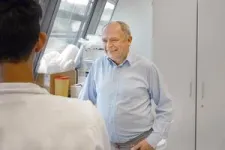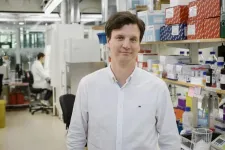(Press-News.org) At school, he was inspired by Schrödinger´s book ‘What is Life?’. Now, several decades later, Leonid Sazanov is awarded the Erwin Schrödinger Prize by the Austrian Academy of Sciences (ÖAW). The scientist heads a research group at the Institute of Science and Technology Austria (ISTA) and was honored “for his outstanding achievements in the field of structural biology of membrane protein complexes.” Sazanov is the sixth ISTA scientist to receive the prestigious Schrödinger Award.
“I am especially honored to receive this price, because it was reading Erwin Schrödinger´s book ‘What is Life?’ back in school which encouraged me to pursue biophysics later at the university,” reminisces ISTA Professor Leonid Sazanov. Born in 1960, his academic path led him through renowned institutions such as the Belarusian State University in Minsk and Moscow State University, where he received his doctorate in biophysics in 1990. He has worked internationally with renowned researchers and mentors, including Chemistry Nobel Prize winner John E. Walker. After 15 years at the University of Cambridge, he joined ISTA in Klosterneuburg in 2015 as the first structural biologist; today his group is an integral part of a thriving community on campus – and beyond.
“I am therefore very pleased to receive the Schrödinger Prize as it does not only underline the achievement of my research group at ISTA: It also shows the importance that the Academy assigns to basic research in general – and to structural biology and to a better understanding of membrane protein complexes in specific. Thus, I consider it an encouragement to all my colleagues around the world who are pursuing this field. Together, we can contribute to a better understanding of the causes of various diseases and lay the foundations for the development of drugs to combat them,” says Sazanov.
Although the Institute of Science and Technology Austria only opened its doors in 2009, five other ISTA professors have already received the Erwin Schrödinger Prize from the ÖAW in the past: the mathematical physicist Robert Seiringer (2023), the mathematician László Erdős (2021), the neuroscientist Peter Jonas (2018), the plant biologist Jiří Friml (2015) and the biologist Nick Barton (2013).
“Being already the sixth scientist at ISTA to receive the Schrödinger Prize further bolsters my conviction that my research is embedded in the right place. The Institute allows for freedom of research to pursue fundamental scientific questions without being hampered by borders between conventional disciplines. I am convinced that this interdisciplinarity is crucial for future scientific developments,” explains this year’s Schrödinger Prize laureate.
Last year, Sazanov already received the Science Prize of the Federal State of Lower Austria. The Schrödinger Prize 2024 is presented on Tuesday, March 12, during a festive ceremony at the Austrian Academy of Sciences.
END
Leonid Sazanov wins Schrödinger Award
Biochemist is the sixth ISTA scientist to receive this highest award by the Austrian Academy of Sciences
2024-03-11
ELSE PRESS RELEASES FROM THIS DATE:
Does worsening metabolic syndrome increase the risk of developing cancer?
2024-03-11
New research indicates that individuals with persistent and worsening metabolic syndrome—which encompasses conditions such as high blood pressure, elevated blood sugar, excess abdominal fat, and abnormal cholesterol—face an elevated risk of developing various types of cancer. The findings are published by Wiley online in CANCER, a peer-reviewed journal of the American Cancer Society.
In the study, 44,115 adults in China with an average age of 49 years were categorized into 4 different trajectories based on trends from ...
New study reveals transgenerational effects of pesticide linuron on frogs
2024-03-11
Grand-offspring of male frogs exposed to the pesticide linuron exhibited changes in their DNA that was linked to significant physiological impacts, a study from Stockholm University reveals. The research highlights the profound transgenerational consequences of environmental pollution on amphibian populations, which are already under threat of extinction. The study is published in the journal Science of the Total Environment.
Amphibians, particularly frogs, play a crucial role in our ecosystem. However, nearly half of all amphibian species ...
Harvard and ONO Pharmaceutical launch university-wide alliance to address multiple disease areas
2024-03-11
Harvard University and Ono Pharmaceutical Co., Ltd. (ONO) have launched a strategic alliance to advance research across a broad range of therapeutic areas. This collaborative effort marks a significant commitment to identify and develop first-in-class therapeutics for medical conditions in the areas of oncology, immunology, neurology, and specialty.
Through a five-year strategic research alliance spearheaded by Harvard’s Office of Technology Development, the request for proposals will be for research projects focused on the validation of novel therapeutic targets from labs across Harvard University including Harvard Medical ...
Dietitian breaks down the science, sifts through the myths, and offers a different way to think about food
2024-03-11
With so many types of diets being promoted online and on social media, a leading dietitian says flexibility is more sustainable than a rigid diet plan.
Joyce Patterson, MPH, RDN, BC-ADM, CPT is a registered dietitian and a diabetes care and education specialist at Michigan Medicine in Ann Arbor, U.S., and she says the science points to a balanced approach.
“We live in a world full of messages to restrict, eliminate, and fast, and misconceptions related to diet trends are common, such as macronutrient ...
Most survivors of childhood cancer don't get the tests needed to detect serious long-term adverse effects
2024-03-11
Surviving childhood cancer does not always mean a clean bill of health, as the treatments that eradicate those cancers can put adult survivors at risk of new cancers and other serious health problems. Despite the existence of surveillance guidelines that recommend screening for adult cancers and other "late effects" of cancer therapy, childhood cancer survivors (CCS) are rarely up to date for recommended tests, according to a large study published in CMAJ (Canadian Medical Association Journal) https://www.cmaj.ca/lookup/doi/10.1503/cmaj.231358 ...
Financial toxicity affects at least one-third of patients with cancer
2024-03-11
At least one-third of Canadians diagnosed with cancer experience financial distress, called "financial toxicity," which adds to the burden of the diagnosis, write authors in a commentary published in CMAJ (Canadian Medical Association Journal) https://www.cmaj.ca/lookup/doi/10.1503/cmaj.230677.
"Financial toxicity, which refers to the direct, indirect, and emotional costs to patients following a cancer diagnosis, is increasingly recognized as a risk factor for poor health and cancer outcomes," writes Dr. Rachel Murphy, University of British Columbia and BC Cancer Research Institute, Vancouver, ...
Going top shelf with AI to better track hockey data
2024-03-11
Researchers from the University of Waterloo got a valuable assist from artificial intelligence (AI) tools to help capture and analyze data from professional hockey games faster and more accurately than ever before, with big implications for the business of sports.
The growing field of hockey analytics currently relies on the manual analysis of video footage from games. Professional hockey teams across the sport, notably in the National Hockey League (NHL), make important decisions regarding players’ careers based on that information.
“The goal of ...
For people who speak many languages, there’s something special about their native tongue
2024-03-11
CAMBRIDGE, MA -- A new study of people who speak many languages has found that there is something special about how the brain processes their native language.
In the brains of these polyglots — people who speak five or more languages — the same language regions light up when they listen to any of the languages that they speak. In general, this network responds more strongly to languages in which the speaker is more proficient, with one notable exception: the speaker’s native language. When listening ...
Blood-based marker developed to identify sleep deprivation
2024-03-09
A blood test that can accurately detect when someone has not slept for 24 hours has been developed by experts at Monash University, in Australia, and the University of Birmingham, in the UK.
This level of sleep deprivation increases the risk of serious injury or fatality in safety critical situations.
Published in Science Advances, the biomarker used a combination of markers found in the blood of healthy volunteers. Together, these markers accurately predicted when the study volunteers had been awake for more than 24 hours under controlled laboratory conditions.
The ...
Paclitaxel-coated balloon vs uncoated balloon for coronary in-stent restenosis
2024-03-09
About The Study: Among patients undergoing coronary angioplasty for in-stent restenosis, a paclitaxel-coated balloon was superior to an uncoated balloon with respect to the composite end point of target lesion failure in this multicenter randomized trial that included 600 patients. Paclitaxel-coated balloons are an effective treatment option for patients with coronary in-stent restenosis.
Authors: Robert W. Yeh, M.D., M.Sc., of Beth Israel Deaconess Medical Center in Boston, is ...
LAST 30 PRESS RELEASES:
COVID-19 vaccination during pregnancy may help prevent preeclampsia
Menopausal hormone therapy not linked to increased risk of death
Chronic shortage of family doctors in England, reveals BMJ analysis
Booster jabs reduce the risks of COVID-19 deaths, study finds
Screening increases survival rate for stage IV breast cancer by 60%
ACC announces inaugural fellow for the Thad and Gerry Waites Rural Cardiovascular Research Fellowship
University of Oklahoma researchers develop durable hybrid materials for faster radiation detection
Medicaid disenrollment spikes at age 19, study finds
Turning agricultural waste into advanced materials: Review highlights how torrefaction could power a sustainable carbon future
New study warns emerging pollutants in livestock and aquaculture waste may threaten ecosystems and public health
Integrated rice–aquatic farming systems may hold the key to smarter nitrogen use and lower agricultural emissions
Hope for global banana farming in genetic discovery
Mirror image pheromones help beetles swipe right
Prenatal lead exposure related to worse cognitive function in adults
Research alert: Understanding substance use across the full spectrum of sexual identity
Pekingese, Shih Tzu and Staffordshire Bull Terrier among twelve dog breeds at risk of serious breathing condition
Selected dog breeds with most breathing trouble identified in new study
Interplay of class and gender may influence social judgments differently between cultures
Pollen counts can be predicted by machine learning models using meteorological data with more than 80% accuracy even a week ahead, for both grass and birch tree pollen, which could be key in effective
Rewriting our understanding of early hominin dispersal to Eurasia
Rising simultaneous wildfire risk compromises international firefighting efforts
Honey bee "dance floors" can be accurately located with a new method, mapping where in the hive forager bees perform waggle dances to signal the location of pollen and nectar for their nestmates
Exercise and nutritional drinks can reduce the need for care in dementia
Michelson Medical Research Foundation awards $750,000 to rising immunology leaders
SfN announces Early Career Policy Ambassadors Class of 2026
Spiritual practices strongly associated with reduced risk for hazardous alcohol and drug use
Novel vaccine protects against C. diff disease and recurrence
An “electrical” circadian clock balances growth between shoots and roots
Largest study of rare skin cancer in Mexican patients shows its more complex than previously thought
Colonists dredged away Sydney’s natural oyster reefs. Now science knows how best to restore them.
[Press-News.org] Leonid Sazanov wins Schrödinger AwardBiochemist is the sixth ISTA scientist to receive this highest award by the Austrian Academy of Sciences



